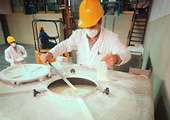HNC Chemical Engineering

The HNC Chemical Engineering builds on candidates' existing knowledge, and their exposure to the systems and processes used in the chemical industry, to develop their knowledge and skills in chemical engineering. It will develop candidates' skills and enhance their employment prospects by providing a wide range of theoretical and practical knowledge. It also develops 'soft' skills such as working in a team environment, producing reports, and communication.
Use the tabs below to open each section individually. Alternatively you can show all the sections.
Why deliver this qualification
Higher National qualifications have been developed by SQA in partnership with colleges, universities and industry ¿ so employers recognise that they provide sound evidence of ability.
The unit-based structure supports flexibility. A unit is typically 40 hours of timetabled learning.
There is a wide choice of optional units which will enable centres to offer courses tailored to meet local needs.
This HNC provides progression routes to further study (see Progression).
Who does this qualification suit
The HNC Chemical Engineering is suitable for a wide range of learners including:
- school leavers
- adult returners to education
- individuals in employment who wish to enhance their career prospects
Access
As with all SQA qualifications, entry is at the discretion of the centre. Examples of formal entry qualifications include:
- a minimum of two Highers from Chemistry, Mathematics or Physics at grade C or above, with appropriate supporting passes at National 5 level (or equivalent SCQF level 5) in appropriate science subjects and Mathematics.
- NC Applied Sciences (which includes Physics units)
- qualifications in appropriate science, chemical engineering and mathematics programmes, such as access programmes ¿ learners should have gained some units at higher level in appropriate science, chemical engineering and mathematics programmes
- suitable work experience gained in a chemical engineering/process setting
Progression and employment
HNCs and HNDs can provide progression to degree-level study. The HNC Chemical Engineering may allow direct entry into the second year of some degree programmes.
Higher National qualifications may also provide the knowledge and understanding required for related Modern Apprenticeships, eg the Modern Apprenticeship in Chemical Process Engineering and Related Industries.
What you'll learn?
The HNC Chemical Engineering builds on candidates' existing knowledge, and their exposure to the systems and processes used in the chemical industry, to develop their knowledge and skills in chemical engineering. It will develop candidates' skills and enhance their employment prospects by providing a wide range of theoretical and practical knowledge. It also develops 'soft' skills such as working in a team environment, producing reports, and communication.
Approval
Centres with devolved authority for approval should use their own internal approval process.
Centres without devolved authority will have to come forward for approval and should contact SQA's Business Development Team for guidance.
Assessors and verifiers must be able to meet SQA's general requirements for technical/occupational competence as outlined in the Guide to Approval
How to assess
Each individual unit specification gives detailed information on the evidence requirements and approaches to assessment for each unit.
Ongoing course assessment will apply.
Where can you take this course?
Qualification Structure
HNC Chemical Engineering
Group award code: GL69 15 (96 SCQF credit points)
HNC Chemical Engineering at SCQF level 7 consists of nine mandatory units (72 SCQF credit points) and a number of optional units (8-24 SCQF credit points).
Group Award Specification
GL69 15 (538 KB) - HNC Chemical Engineering
Optional assessment guidance
This guidance is optional. You can use this guidance or deliver and assess as outlined in the group award specification.
Optional assessment guidance (251 KB)
See also the general HNVQ optional assessment guidance: Information and guidance for centres.